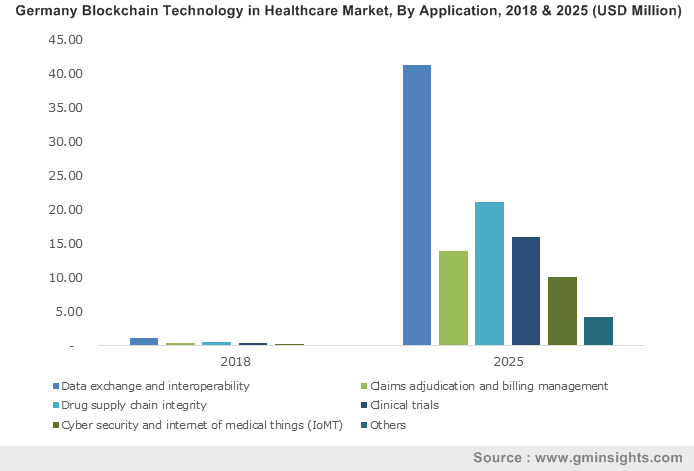Blockchain technology in healthcare market to witness augmented demand from IoMT applications, global industry remuneration to exceed a staggering USD 1,636.7 million by 2025
Publisher : Fractovia | Published Date : 2019-03-05Request Sample
Globally, the blockchain technology in healthcare market has become a prominent theme of discussion owing to numerous advantages it would bring for health service providers, pharmaceutical companies as well as consumers. The secure, immutable nature of blockchain transactions has produced tremendous interest in its use for reinforcing supply chains and ensuring reliable data sharing among multiple parties involved. Due to rapid advancement achieved in the cryptocurrency space, blockchain is no more an unchartered territory and tech companies have been able to leverage it to offer viable solutions for other domains as well. The blockchain technology in healthcare industry is one such area where experts are extremely confident that continuous innovations will lead to remarkable cost savings and improvement in customer satisfaction.
U.S. blockchain technology in healthcare market, by application, 2018 & 2025 (USD Million)

Essentially, blockchain could be vital for sharing business information and for effective automation of processes across the enterprise value chain, where inconsistency in data reconciliation and mishandling could result in massive loses. Several application segments like insurance payers, medical aid providers and hospitals could save billions of dollars every year with the help of products enabled by the blockchain technology in healthcare market. Citing an example, an insurance company has to assess a customer’s claim application and needs to compare information provided with its own database. With a blockchain-based platform, this process could be quick and will avoid data manipulation, while any issues with the claim can be determined efficiently.
Insurance frauds are becoming a major concern for healthcare payers, who need a cost-effective solution to counter them, creating a broad customer base for the blockchain technology in healthcare industry. According to data provided by the Coalition Against Insurance Fraud, most Canadian and U.S. insurers report that almost 5% to 10% of their claims cost is made up of fraud accounts, whereas nearly one-third of them say fraud constituted as high as 20% of claim costs for them. Considering the vast coverage of health insurance provided in the region by government and private companies, it is no surprise that scams against healthcare insurers are the biggest kind of insurance fraud in North America. Minimizing this issue and enhancing the efficiency of claim adjudication process will prove as a critical application area for the blockchain technology in healthcare market.
Recently, the internet of medical things (IoMT) has become an emerging application of the internet of things, which involves the utilization of a network of connected devices for sensing vital information on a real-time basis. IoMT is pegged by medical experts as having the potential to transform personalized healthcare considerably with the help of patient data-driven treatment solutions, presenting a lucrative user-based application for the blockchain technology in healthcare industry. North America consists of leading healthcare service providers, health insurance companies as well as numerous technology firms focused on enhancing individual medical treatments using fitness trackers and other devices such as point of care kits or mobile apps. Blockchain can be helpful in securing the machine-to-machine and patient to healthcare payer data transfer, for instance real-time data from a smart wearable to authorized medical professional.
Speaking further, healthcare payers can also incentivize individuals to maintain their health through smart wearables, by tracking their daily health and fitness regiment and providing monetary benefits on health insurance policies. Separately, there is an opportunity to link cryptocurrency and physical health of a patient, by offering fixed amount of crypto for completing certain fitness goals. The blockchain technology in healthcare market in North America is anticipated to witness a rapid growth in this segment. Citing an example to describe the possibilities of the technology, Sweatcoin is a mobile app which tracks outdoor steps of individuals daily and pays digital currency to the users which can later be utilized to buy gifts. Similar products can be provided to people by healthcare payers for expanding their reach into the IoMT segment and enable better services for their customers.
To surmise, the North America blockchain technology in healthcare market would be experiencing a remarkable adoption rate due to the growing demand for IoMT products, with estimates suggesting that smart watches had exhibited nearly 60% growth rate in the U.S. in 2018. Presence of key players like Microsoft, Patientory and IBM will further propel remunerations for the blockchain technology in healthcare industry across the region.